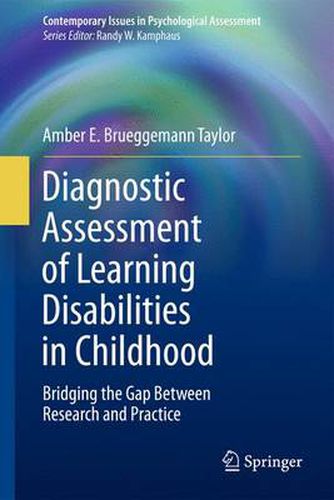Readings Newsletter
Become a Readings Member to make your shopping experience even easier.
Sign in or sign up for free!
You’re not far away from qualifying for FREE standard shipping within Australia
You’ve qualified for FREE standard shipping within Australia
The cart is loading…






This title is printed to order. This book may have been self-published. If so, we cannot guarantee the quality of the content. In the main most books will have gone through the editing process however some may not. We therefore suggest that you be aware of this before ordering this book. If in doubt check either the author or publisher’s details as we are unable to accept any returns unless they are faulty. Please contact us if you have any questions.
Diagnosing learning disabilities (LD) in children has never been an easy task. The multiple approaches in use complicate the assessment process, raising the risk of young students getting the wrong services, or none at all. It is clear that more accurate diagnosis and classification methods are needed to advance the prevention and treatment of difficulties in reading and mathematics.
Diagnostic Assessment of Learning Disabilities in Childhood takes important steps to cut through the confusion. This timely resource weighs the strengths and weaknesses of commonly used assessment methods including the aptitude-achievement discrepancy, cognitive processing, RTI and low achievement approaches and introduces the author’s academic impairment model as a promising alternative. A chapter on comorbid disorders in students with LD guides readers in the fine points of differential diagnosis. And to make the coverage especially practical, the book’s features link the theoretical to the real-world practice of LD assessment, among them:
Overviews of LD identification and definitions. Analysis of widely used diagnostic approaches with strengths and weaknesses. Examples of assessment protocols and report writing. Case examples illustrating diagnostic issues. Q&A sections with leading experts in the field. Useful summaries, appendices and resource links.
Diagnostic Assessment of Learning Disabilities in Childhood is an invaluable reference for school and clinical child psychologists, special education and allied educational professionals and researchers and graduate students in school, educational and clinical child psychology who are dedicated to higher measurement standards and greater opportunities for children’s academic success.
$9.00 standard shipping within Australia
FREE standard shipping within Australia for orders over $100.00
Express & International shipping calculated at checkout
This title is printed to order. This book may have been self-published. If so, we cannot guarantee the quality of the content. In the main most books will have gone through the editing process however some may not. We therefore suggest that you be aware of this before ordering this book. If in doubt check either the author or publisher’s details as we are unable to accept any returns unless they are faulty. Please contact us if you have any questions.
Diagnosing learning disabilities (LD) in children has never been an easy task. The multiple approaches in use complicate the assessment process, raising the risk of young students getting the wrong services, or none at all. It is clear that more accurate diagnosis and classification methods are needed to advance the prevention and treatment of difficulties in reading and mathematics.
Diagnostic Assessment of Learning Disabilities in Childhood takes important steps to cut through the confusion. This timely resource weighs the strengths and weaknesses of commonly used assessment methods including the aptitude-achievement discrepancy, cognitive processing, RTI and low achievement approaches and introduces the author’s academic impairment model as a promising alternative. A chapter on comorbid disorders in students with LD guides readers in the fine points of differential diagnosis. And to make the coverage especially practical, the book’s features link the theoretical to the real-world practice of LD assessment, among them:
Overviews of LD identification and definitions. Analysis of widely used diagnostic approaches with strengths and weaknesses. Examples of assessment protocols and report writing. Case examples illustrating diagnostic issues. Q&A sections with leading experts in the field. Useful summaries, appendices and resource links.
Diagnostic Assessment of Learning Disabilities in Childhood is an invaluable reference for school and clinical child psychologists, special education and allied educational professionals and researchers and graduate students in school, educational and clinical child psychology who are dedicated to higher measurement standards and greater opportunities for children’s academic success.